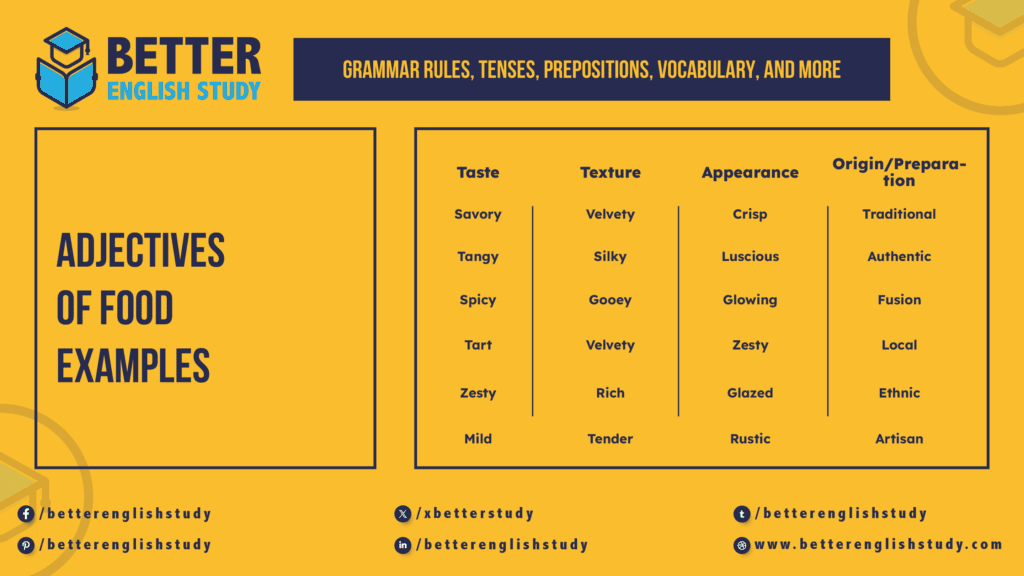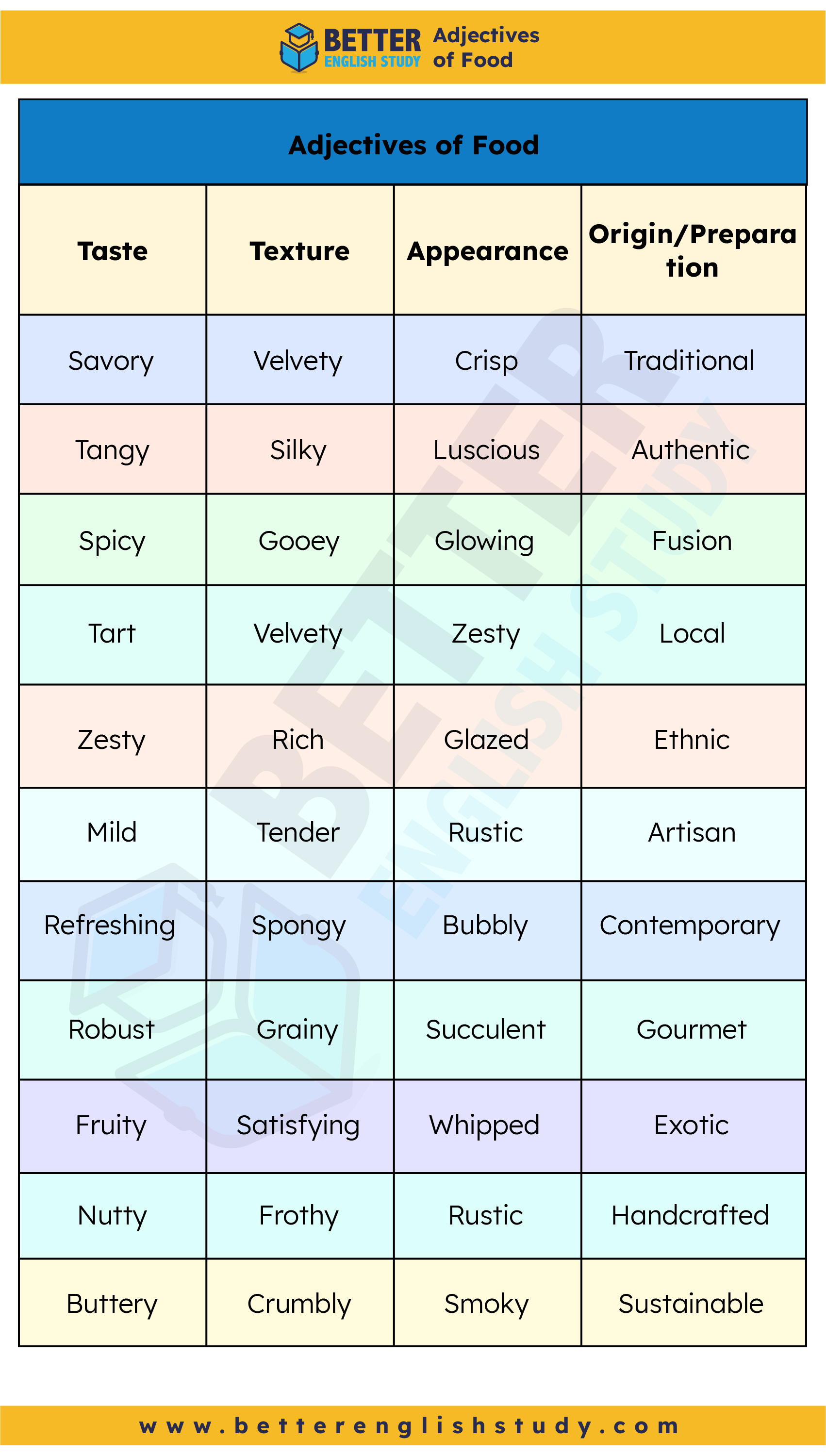
Are you a food enthusiast looking to expand your culinary vocabulary? Whether you’re a budding chef or simply enjoy describing the flavors and textures of your favorite dishes, understanding adjectives of food can add depth to your language and enhance your dining experiences. From savory to succulent, let’s delve into the world of adjectives that bring food to life.
What are Adjectives of Food?
Adjectives of food are descriptive words used to characterize the taste, texture, appearance, origin, or preparation of food. They help paint a vivid picture of culinary experiences, allowing us to express our preferences and convey sensory impressions.
Let’s break down the different types of adjectives of food with examples:
1. Adjectives of Taste
These adjectives describe the flavor profile of food, ranging from sweet and salty to bitter and umami.
Examples:
- Sweet: A ripe mango
- Salty: Crispy potato chips
- Bitter: Dark chocolate
- Umami: Savory miso soup
2. Adjectives of Texture
Texture plays a crucial role in how we perceive food. These adjectives describe the mouthfeel and consistency of dishes.
Examples:
- Crunchy: Fresh celery sticks
- Creamy: Smooth mashed potatoes
- Chewy: A dense bagel
- Flaky: Buttery croissants
3. Adjectives of Appearance
Visual appeal is essential in culinary experiences. These adjectives describe the appearance of food, enticing our eyes before we even take a bite.
Examples:
- Vibrant: Colorful fruit salad
- Glossy: Glazed donuts
- Crisp: Golden-fried chicken
- Juicy: Juicy strawberries
4. Adjectives of Origin or Preparation
These adjectives indicate the source or method of preparing a dish, adding cultural context and depth to descriptions.
Examples:
- Italian: Classic spaghetti carbonara
- Grilled: Tender grilled salmon
- Homemade: Warm homemade apple pie
- Organic: Fresh organic vegetables
How are Adjectives Related to Food?
Adjectives play a crucial role in expressing our culinary experiences and preferences. They allow us to communicate effectively about food, whether we’re describing a dish to a friend, writing a recipe, or reviewing a restaurant.
For example, when recommending a restaurant, you might say, “The grilled shrimp was succulent, and the homemade pasta was perfectly al dente.” These adjectives provide valuable insight into the dining experience, helping others make informed choices.
List of Adjectives of Food
Expand your culinary vocabulary with these adjectives:
| Taste | Texture | Appearance | Origin/Preparation |
| Savory | Velvety | Crisp | Traditional |
| Tangy | Silky | Luscious | Authentic |
| Spicy | Gooey | Glowing | Fusion |
| Tart | Velvety | Zesty | Local |
| Zesty | Rich | Glazed | Ethnic |
| Mild | Tender | Rustic | Artisan |
| Refreshing | Spongy | Bubbly | Contemporary |
| Robust | Grainy | Succulent | Gourmet |
| Fruity | Satisfying | Whipped | Exotic |
| Nutty | Frothy | Rustic | Handcrafted |
| Buttery | Crumbly | Smoky | Sustainable |
20 Example Sentences with Adjectives of Food
- The tangy lemonade quenched my thirst on a hot summer day.
- The buttery croissants melted in my mouth with each bite.
- The spicy curry warmed me up on a chilly evening.
- The velvety chocolate mousse was a decadent dessert.
- The refreshing watermelon salad was a delightful palate cleanser.
- The savory aroma of the stew filled the kitchen.
- The tangy barbecue sauce added depth to the grilled chicken.
- The creamy risotto was the highlight of the meal.
- The crunchy lettuce added texture to the salad.
- The zesty salsa gave the tacos a burst of flavor.
- The flaky pastry layers of the pie were perfectly crisp.
- The juicy burger was cooked to perfection.
- The nutty flavor of the cheese complemented the wine.
- The smoky aroma of the barbecue lingered in the air.
- The refreshing mint leaves added a pop of color to the dish.
- The rich aroma of coffee filled the room.
- The tangy marinade infused the meat with flavor.
- The creamy soup was a comforting treat on a cold day.
- The crispy fries were seasoned to perfection.
- The fruity sangria was a refreshing beverage on a sunny afternoon.

FAQs on Adjectives of Food
Can adjectives of food be subjective?
Yes, adjectives of food can be subjective, as taste preferences vary from person to person. What one person finds spicy, another may find mild.
How can I improve my use of adjectives of food?
Experiment with different dishes and pay attention to the sensory experiences they evoke. Try to describe the taste, texture, and appearance using specific adjectives.
Are there any rules for using adjectives of food?
There are no strict rules, but it’s essential to use adjectives that accurately convey your sensory experiences. Experiment with different adjectives to find the ones that best describe the food you’re discussing.
Mastering adjectives of food can elevate your culinary vocabulary and enhance your ability to express your dining experiences. Whether you’re describing the flavors of a dish or recommending a restaurant to a friend, these descriptive words add depth and richness to your language. So, go ahead, explore new flavors, and let your taste buds guide your words.
